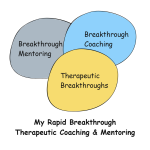Leigh D Wilson
All right, I thought I’d share with you some lessons that I learned recently at a time when I realized that there was a real possibility that I was going to die.
I guess the story begins at 4 am one morning a few months ago when I was in such massive pain and having such difficulty breathing that I felt that there was no option but to ring the ambulance.
This followed on from a previous visit to the hospital after I tripped while running. I run every day and I tripped while avoiding a car, landing heavily on a concrete kerb, resulting in three fractured ribs and a punctured lung.
My ribs were healing well and so things were going well but I was then bitten by a dog and ended up back in hospital leading to surgery. So here I was, a third time, facing going to hospital with no option but to ring the ambulance.
I’d been coughing all day long and all night long for the previous month and nothing I could do would clear the obstruction that was causing the cough. All the while I was getting weaker and weaker because I hadn’t been able to sleep and hadn’t been able to eat because of the coughing. I tried everything I could to alleviate it but nothing, nothing worked and so here I was desperate and calling the ambulance.
I was quite sure that I’d re-fractured the ribs with all my coughing and so I guessed that this was adding to the pain.
After the ambulance arrived and took me to hospital, I was admitted to a COVID screening ward because they weren’t sure that my respiratory problem wasn’t COVID-related. So, until they were sure that I wasn’t infected by COVID that I was temporarily totally isolated from everybody, and the nurses and doctors had to wear full PPE etc. when they came to see me. Even after the fact that my problem was not COVID-related was clarified, this continued until a bed became available in a more normal ward.
So, it was very lonely, I guess, but worst of all was just the incessant coughing and having such difficulty breathing.
I originally thought that once I was reached hospital that they’d find something pretty quickly to ease the pain and to prevent the coughing, but there was nothing they could do, other than surgery, and there was no bed available in the respiratory wing.
So, it wasn’t long until I was getting really, really desperate!
I’ve normally I’ve got a pretty strong resilience but was starting to feel so weak that I was begging the doctors. I was saying to them “look I don’t have the reserves to keep going” because I was just so incredibly weak from a month of coughing, not sleeping and not eating. And I kept having these coughing fits, which would make it worse, especially as I was unable to breathe while I was having them.
So, I was at a very, very low ebb, which was when I realized that maybe I wasn’t going to get through this.
Now, this is a video that I wouldn’t normally make. I’m making it because I’ve been encouraged to do so by a friend who felt that some of the things that I learned at this time might be useful to others. And, given my mission in life is to pass on the things that I learn and find helpful to others, it seems appropriate to make this it.
It turned out that I was suffering from very serious pneumonia along with associated complications, which included about three litres of fluid building up in the space between my lungs and my rib cage, which was pressing on my lungs, causing the coughing and also on the broken ribs.
They originally carried out a relatively simple operation to try and enable this infected fluid to be drained away from my lung and from my chest cavity but that didn’t work, so it wasn’t until I had a much more major operation that they were slowly able to drain the fluid.
All this took quite a few weeks and several courses of antibiotics, over which time I had to lie absolutely flat on my back to reduce the coughing. As a result, I became very, very weak.
I lost nine kilogram in in weight, which I think was mainly muscle and was so weak that I even had difficulty going to the toilet. So yeah, I reached a pretty low state. After mentioning some of this to my friend, she asked me what it was that helped me get through this time.
And I think this is where perhaps the more valuable learnings might lie.
What it was that helped me get through this time?
The first and the most important thing was connection: my connection to my friends and family, to the doctors and nurses (I reckon there were probably about 30 doctors and nurses who cared for me over the time I was in hospital) – the connection to my friends, family, doctors, nurses. It was just amazing how important this became.
Earlier on, my family members would text me, often many times a day as I had trouble talking on the phone because of my coughing. I’d have to read their messages while lying flat on my back because I’d start coughing if I sat up at all.
So, it was a connection to people, to other people, that that meant so much to me. There was one time when I was being wheeled in for the major surgery when a junior doctor walked beside the trolley holding my hand. While that might sound trivial, I can’t tell you how much that meant to me.
There was another time when a senior nurse came up and gave me a really big hug, which too, was just so powerful.
So, connection was incredibly important. I think we tend to take our connection and relationships for granted but I want you to understand that these can be lifesaving. They are really, really important and it’s not until the chips are really down that you can come to realise just how precious they are.
The next lesson I think was the question of gratitude. I’ve always been, I think, a fairly grateful person and so was incredibly grateful to the doctors and the nurses who cared for me. I was also unbelievably grateful for the medical system that was supporting me in this way. I mean, we’ve surely got the world the world’s best medical system here in Australia.
And, of course, I was grateful for the love and support that I was getting from my friends and family, which was just absolutely outstanding.
Gratitude is actually a very powerful emotion, and something that can be overlooked a bit. We tend to talk about love a lot, but love can be complicated because love can also be associated with hurt – gratitude doesn’t have that complication and, in fact, some experiments I’ve done with biofeedback have proven to me that gratitude is actually a more powerful and more healing emotion than any other.
So, I was very, very grateful and, I think because I was grateful, the nurses and doctors picked up on that and responded really well to it, because in part, I suspect they probably don’t get as much gratitude as they deserve.
In fact, it was amazing at the end of it all when I said to one of the doctors “thank you so much for what you’ve done for me. I just I can’t tell you how grateful I am” and the doctor said back to me “thank you for letting us care for you”. That was incredibly powerful!
So, gratitude was really important factor.
Another really important factor was the fact that I felt that I’ve got a lot more to achieve in my life. I’ve got a lot more that I want to do so it’s not time to go yet!
Eventually I was discharged from a hospital and was so weak that I couldn’t even walk out to the front gate. But slowly and surely I got stronger and so now, after about a little over two months, I’m able to run four kilometres pretty well pain-free, although not very fast, I must say.
I feel that I’m healing at a really great rate and that’s in spite of the fact that the doctors said that they thought it would take six to twelve months for me to get back to where I was. I’m not there yet, but I’m well on the way.
So how did I do that well? As soon as I felt strong enough, I started walking. I walked very short distances just around the backyard because I couldn’t walk very far at all, but every day I made a point of just walking just as much as I felt I was able to.
Some days it was a bit longer and some days it was shorter. Because I’ve been running for so many years, I’m used to monitoring my body and observing and knowing what to push through and what not to push through, so this helped a lot.
Eventually I reached the point after about a month of walking that I felt I could try running so I ran a very, very short distance very, very slowly. It felt as if I only had one lung and that lung was absolutely burning as I ran, so breathing was very, very hard
Nevertheless, slowly but surely, I would combine running and walking and go further. In fact, now I run up to 4 km around lunchtime and then in the evening I’ll go for a walk which might be up to 4km as well, so I’m combining the two forms of exercise to build up my strength.
So, the lesson from this was that to practice consistently, really consistently. This was the lesson in how to how to get over this.
In fact, one incentive I have is that I keep a chart, a simple little diary calendar where the colored squares indicate whether I’ve run, or just walked, or not exercised at all. It quickly tells me how far I’ve run and how far I’ve walked and how fast I’ve run, and my incentive is to make sure that I color in every square, one way or another, either with a run and a walk, or just a walk, or just a run.
So what was the list of lessons overall? To summarize them:
- when your back is to the wall, the things to remember are:
- your connection to others, how valuable and precious that is
- focus on feelings of gratitude, remembering that there is always something that you can be grateful for. No matter where you are, no matter how bad things are, I’m sure you can always find something to be grateful for
- to realize it there’s a lot more you can do with your life, that it’s not time to go yet, that’s for sure
- and to recover quickly from a setback
- careful consistent action is really helpful.
These are the things that helped me. So, I hope that hearing about the lessons that I learned, in some way, will be helpful to somebody.
To finish, I’m going really well, so nobody’s got to worry, so thank you for listening
Edited transcript







